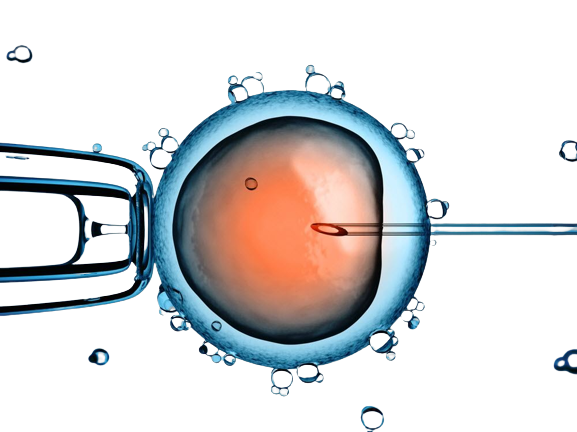Intracytoplasmic Sperm Injection (ICSI)
Empowering Parenthood with Precision and Possibility
ICSI, short for Intracytoplasmic Sperm Injection, is an advanced assisted reproductive technology technique used in fertility treatments. It is primarily employed to address male infertility factors, such as low sperm count, poor sperm motility, or abnormal sperm morphology. During the ICSI procedure, a single sperm is directly injected into an egg, bypassing natural fertilization barriers

The process involves the following steps :
Sperm Selection
A highly skilled embryologist carefully selects a healthy and viable sperm using specialized microscopic tools.
Microscopic Injection
The selected sperm is precisely injected into the egg's cytoplasm using a fine needle. This ensures fertilization by facilitating the fusion of the sperm and the egg.
Embryo Development
After successful fertilization, the fertilized egg develops into an embryo under close observation in a laboratory setting before being transferred to the uterus for potential implantation.
WHO SHOULD CONSIDER ICSI?
Intracytoplasmic Sperm Injection (ICSI) is typically recommended for couples or individuals who face specific fertility challenges related to male factor infertility. The following scenarios may warrant the use of ICSI: .
Why (ICSI)

Low Sperm Count
If a man has a low sperm count (oligospermia) or an absence of sperm in the ejaculate (azoospermia), ICSI can be an effective treatment option. It allows for the direct injection of a single sperm into an egg, bypassing the need for a large number of sperm.

Poor Sperm Motility
When sperm have difficulty moving and swimming properly (poor motility), ICSI can help overcome this obstacle by manually injecting a selected sperm into the egg.

Abnormal Sperm Morphology
If a man's sperm has abnormal shapes or structures (teratozoospermia), ICSI can facilitate fertilization by directly injecting a morphologically normal sperm into the egg.

Previous Fertilization Failure
In cases where conventional IVF has resulted in unsuccessful fertilization, ICSI may be recommended to increase the chances of successful fertilization by introducing a sperm directly into the egg.
INNOVATIONS AND OPTIONS

:
It's important to note that the decision to undergo ICSI should be made in consultation with a fertility specialist. They will evaluate the specific circumstances, conduct diagnostic tests, and recommend the most suitable treatment option based on the individual or couple's fertility profile..

:
Intracytoplasmic Sperm Injection (ICSI) is typically recommended for couples or individuals who face specific fertility challenges related to male factor infertility. The following scenarios may warrant the use of ICSI: .
SUCCESS RATES AND CONSIDERATIONS
Increased Fertilization Rates: ICSI has significantly improved fertilization rates compared to conventional IVF, making it an effective option for couples with male infertility issues.
Genetic Concerns: ICSI can be combined with Preimplantation Genetic Testing (PGT) to screen embryos for genetic abnormalities, offering further insights and options for building a healthy family.
Emotional Support: The emotional journey of infertility can be challenging. Gynescope provides counseling and support to help couples navigate the ups and downs of the ICSI process.
GYNESCOPE
Contact Us
Call: +234 816 659 3030
Email: gynescope@yahoo.com
Address: G.U Ake Rd 22/23
Newsletter
© 2023 Gynescope All Rights Reserved

